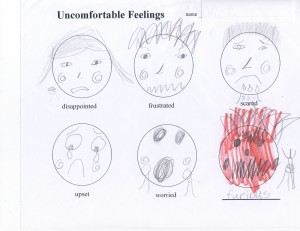|
|
July 28, 2014
 Feeling uncomfortable? Now use it for good. As we approach the beginning of the new school year, my heart goes out to the kids who are dreading it. They are usually the ones who had to wade through more than their share of social garbage last term. Hopefully they got a needed reprieve during the summer. But they’ve got to go back and most of them (and their parents and teachers) are probably not looking forward to the inevitable crapola (online and off).
Being in the prevention business, I’m always working on ways to make schools more compassionate. Here’s my latest contribution… just a reminder… adapted from the Charter for Compassion’s call to action for cities.
A compassionate school is an uncomfortable school!
Uncomfortable when anyone is threatened, harassed, or made to feel less than.
Uncomfortable when every child isn’t treated with respect by every teacher and every other student.
Uncomfortable when every student isn’t given rich opportunities to grow intellectually, creatively, and emotionally.
Uncomfortable when, as a school community, we don’t treat each other as we want to be treated.
A compassionate school knows uncomfortable feelings aren’t worth zippo, if they don’t trigger action. So a compassionate school recognizes the discomfort and immediately works for change with the full leadership and commitment of all administrators and teachers. With adult leadership, students learn how they too can become change agents. Because, whether students admit it or not, they desperately want their school to be a place where every kid is treated with respect. Every one.
Got it? Good. Now go make your kid’s school really uncomfortable. We’re in this together.

July 21, 2014
The implication, when we speak of kids or adults with special needs, is that “they” are unlike “us.” But isn’t it true that we’ve all got special needs? Maybe the only difference is that some needs are more obvious than others. And some, obviously, require more day-to-day support. Other than that… everyone deserves to be noticed, respected, listened to, and understood. But what happens to a child with less obvious needs when Mom or Dad also have a kid with more obvious needs?
 Beth and Rachel Simon A while back I had the privilege of interviewing award-winning author Rachel Simon for my Family Confidential podcast. Rachel’s books include New York Times bestsellers The Story of Beautiful Girl and Riding the Bus With My Sister (which was adapted into a Hallmark Hall of Fame film starring Andie MacDowell and Rosie O’Donnell, and directed by Angelica Huston.)
 Riding the Bus With My Sister, the film Rachel’s younger sister, Beth, has an intellectual disability. Because of Rachel’s personal family history, her years of research into disability/sibling issues, and her connection to the Sibling Community, she speaks with a rare eloquence and sensitivity about the treatment of people with disabilities and how parents can do a better job of attending to the special needs of all their children.
Listen to my recent Family Confidential podcast interview with Rachel right here.

July 16, 2014
 Who gets to break my heart without my permission? Breaking up is hard to do. And painful. Hopefully, though, there were good times before the relationship tanked, so at least you’ve got some happy memories. On the other hand, if you’re obsessed with someone who was never nice to you, well, that’s just pain on pain. No one needs that.
Recently got an email from a girl in that dark place. Read on…
My heart aches for him and I really want to move, but I find myself checking his instagram, facebook, and all other social media just to see him. I cant let go, even though I want to so bad. I’m torn between wanting him to want me and wanting to forget about him completely. It’s been almost a year. I just hate this obsession. What do I do? –So Stuck
Dear So Stuck,
The truth may hurt, but I’ve got to say it anyway. This guy doesn’t care about you, That’s the way it is. You may wish things were different, but all the wishing in the Known Universe and beyond will not change fact.
Here’s something else that’s true: You deserve someone who wants to be with you as much as you want to be with him. This guy is not The One. The sooner you accept it, the sooner you will find The One (Maybe during this coming school year! There’s an exciting thought!)
In the meantime, you’ve got to stop checking up on this guy. It’s a total waste of the summer and, more important, it’s bringing you down. You have gotten into an unhealthy habit here, but you can get back in control. Here’s how:
1. Make an agreement with yourself to stop stalking him.
2. Whenever you get the thought, “I’ll just check his instagram, FB, etc.” notice that thought.
3. Imagine the device you’re holding is burning hot. Get your hands off the darn thing right now this minute!
4. Close your eyes and BREATHE mindfully. Inhale slowly and evenly through your nose. Then relax your jaw and exhale, slowly and evenly through your mouth. Repeat 5 times….. S-L-O-W-L-Y.
5. Did you do it? If not, what are you waiting for? Do it now.
6. After breathing, the urge to “check on him” should be less intense. If not, breathe some more. If it is less, congrats! You got yourself back in control. Well done. You know how to do this. And you’ll probably get lots of practice. Whenever you feel the urge to check up on him, think “Fire!!! Will not get burned again. Hands up! Breathe…”
7. Go do something you enjoy. Something away from the phone or computer with people you like who like you back.
I hope this helps.
In friendship,
Terra

July 14, 2014
 I just wish they’d stop screaming at each other! What can I say about parents divorcing that you don’t already know from personal experience or what you’ve observed? Probably nothing. For the couple involved, divorce is one of life’s major upheavals (second only to Death of a Spouse). The whole family feels the impact of divorce and its aftershocks, but adults and kids process it differently.
Young children are very egocentric. As long as their moment-to-moment needs continue to be met, they’re less aware of what’s going on in the family. They’re also not skilled at “covering up.” If they feel tension between Mom and Dad, they will let behave in ways that let everyone know “I’m not happy!” Parents will respond, as best as they can, by comforting the children and/or distracting them. It usually works pretty well.
Teens, on the other hand, are often more distressed by divorce than their younger siblings, and more likely to mask their emotions. Without letting on what’s going on, Mom and Dad might assume their teens are “OK” when they are far from it. Why do teens hide their feelings? Because they don’t:
a) know how to express the intensity of their emotions (ager, sadness, confusion, guilt, fear, etc.)
b) want to add to their parents’ problems
c) want to get yelled at
d) want to choose sides
e) want to show that they’re not “mature enough” to handle what’s going on
f) all of the above
On this week’s Family Confidential video podcast, I talk with Wendy Young, child and adolescent therapist and founder of Kidlutions. We discuss pragmatic parenting tips for helping kids of all ages navigate the emotional challenges of divorce. – Listen here
 — Older Posts »
| |
















